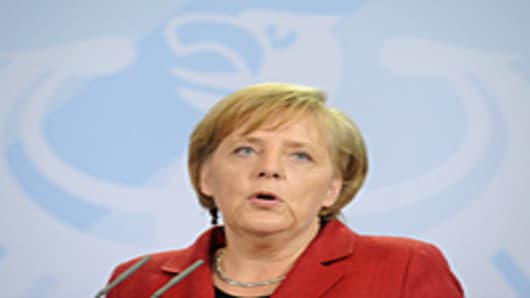A viewer tweeted me last week (@louisabojesen) saying "Don't phone lines exist between Berlin and Paris? Why was the face-to-face meeting necessary between French President Nicolas Sarkozy and German Chancellor Angela Merkel?"
Perhaps the viewer was disappointed at the progress that face-to-face meeting managed to produce. European leaders continue to have their work cut out for them, and even though we now know they're not (officially) moving toward introducing a Eurobond LINK, that's still the direction many in the market argue makes the most sense. Even if it would mean Germany once again taking on the role of casino paymaster, with the richer European countries underwriting the debts of the poorer ones.
Chancellor Merkel and Persident Sarkozy also said they wouldn't increase the size of the European Financial Stability Facility (EFSF) — a fund designed to stabilize European monetary union by providing assistance member states in trouble — but many are tempted to ask: why not? Analysts would like to see the value of the EFSF increased, once and for all, from its current 440 billion euros ($633.5 billion) to the other side of 2 trillion euros ($2.88 trillion). Size does matter when it comes to stabilizing large economies — in the US, the government threw a big pile of money at the problem from the word go with the introduction of the Troubled Asset Relief Program (TARP), allowing the US Treasury to buy or insure around $700 billion of financial institutions' "troubled assets".
However, by increasing the value of the EFSF, Europe would also be adding to its long-term debt pile, so it would be important to ensure that the money would be put to uses that will actually spur growth. Especially if we're still looking at worries about bank liquidity. Just because you increase the value of the EFSF, that doesn't necessarily mean that markets will stabilize if the money isn't being put to use in the right way.
I spoke to Satish Pulle, a portfolio manager at European Credit Management (they manage more than 10 billion euros worth [$14.4 billion] of European credit) about this very issue. He said recent concerns about the French banks have been overblown, and that while they may need some capital to strengthen their balance sheets from good to very strong, liquidity is not as big a concern as the markets have lately made it out to be.
Pulle suggested a possible solution to the European sovereign debt and bank situation could be using EFSF funding as capital for the banks. That, in turn, according to Pulle, would prevent an escalation of concerns over bank capital and funding. Pulle went on to explain that if you strengthen the banks directly, they could then help with sovereign issuance over the next few months... and that is exactly how the US used the TARP program.
The approach, Pulle said, would eventually end up greatly reducing the total amount of bailout funds required. It's an important point: Pulle believes the European sovereign-bank crisis is a bigger issue for global markets than the rising probability of a US recession .


